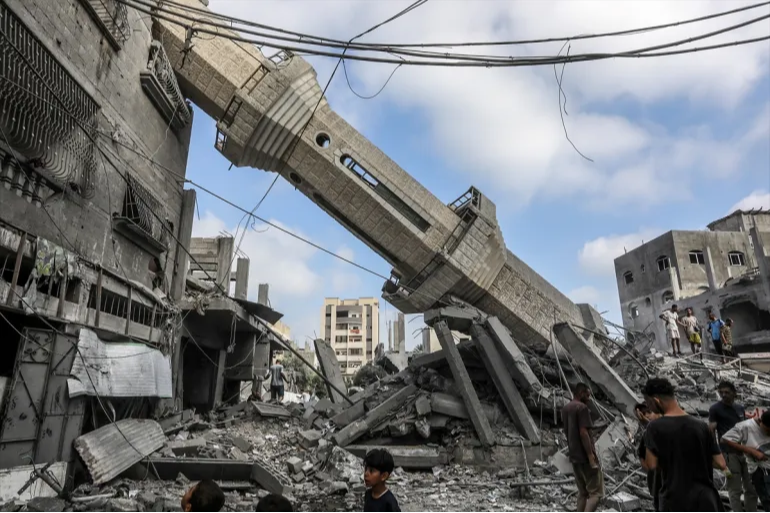
People inspect the remains of a collapsed building with a destroyed mosque tower lying on its side
A view of destruction at Abdullah Azzam Mosque after Israeli air strikes in the central Gaza Strip last month [File: Abed Rahim Khati/Anadolu Images]
Ankara, August 8 (RHC)-- Turkey has submitted a formal bid to join South Africa’s genocide case against Israel at the International Court of Justice (ICJ), a move that adds to the international pressure on the Israeli government to end its atrocities in Gaza.
A Turkish delegation, including Ankara’s ambassador to The Hague, Selcuk Unal, officially filed the request on Wednesday, the country’s news agency Anadolu reported.
Turkey’s “decision to intervene reflects the importance our country attaches to resolving the Palestinian issue within the framework of law and justice”, the Turkish Foreign Ministry said in a statement on Wednesday. “The conscience of humanity and international law will hold Israeli officials accountable.”
Turkey has now become the seventh country formally seeking to join the case at the United Nations top court after Colombia, Nicaragua, Spain, Libya, Palestine and Mexico.
Reporting from Istanbul, Al Jazeera’s Sinem Koseoglu said the Turkish request will boost the case against Israel. “When you have more parties participating in these kinds of cases, the case gets stronger against the offender,” Koseoglu said.
The South African case, which cites numerous statements by Israeli officials calling for punishment of Palestinian civilians, accuses Israel of carrying out a genocide in Gaza.
The UN’s Genocide Convention defines genocide as “acts committed with intent to destroy, in whole or in part, a national, ethnical, racial or religious group”, including killings and measures to prevent births.
South Africa filed the case in January and asked the court for urgent provisional measures to end the killing of Palestinians while the matter is being litigated – a process that could take years. The UN top court responded by ordering Israel to take steps to prevent genocide in Gaza, including ending the killing of Palestinians and ensuring the provision of humanitarian assistance to civilians. But the judges stopped short of explicitly ordering a halt to the Israeli offensive.
In March, the court again ruled that Israel must ensure that basic food supplies reach people in Gaza without delay as starvation deepened in the territory amid the Israeli blockade. Two months later, the ICJ ordered Israel to “immediately halt its military offensive” in Rafah where most of Gaza’s displaced population was sheltering. The Israeli government ignored the ruling.
The ICJ’s decisions are binding, but there is no established mechanism to enforce them. The UN Security Council (UNSC) can pass resolutions to impose sanctions against parties that violate the court’s decisions, but moves against Israel at the UNSC have often been blocked by the veto power of the United States.
In a separate case last month, the ICJ declared in an advisory opinion that Israel’s occupation of the Palestinian territories is illegal and must end “as rapidly as possible”.
In July, Turkish President Recep Tayyip Erdogan suggested that Turkey might “enter” the conflict to help Palestinians, drawing outrage from Israeli officials – particularly the country’s Foreign Minister Israel Katz.
Last week, Katz slammed Erdogan and accused him of turning Turkey into a “dictatorship.” The Turkish Foreign Ministry said earlier this week that Katz has been spreading “lies” about Turkey and its president.
“For some time now, the person in question cannot be taken seriously,” it said in a statement, adding that Ankara “will continue to support the Palestinians in the strongest possible way”.

